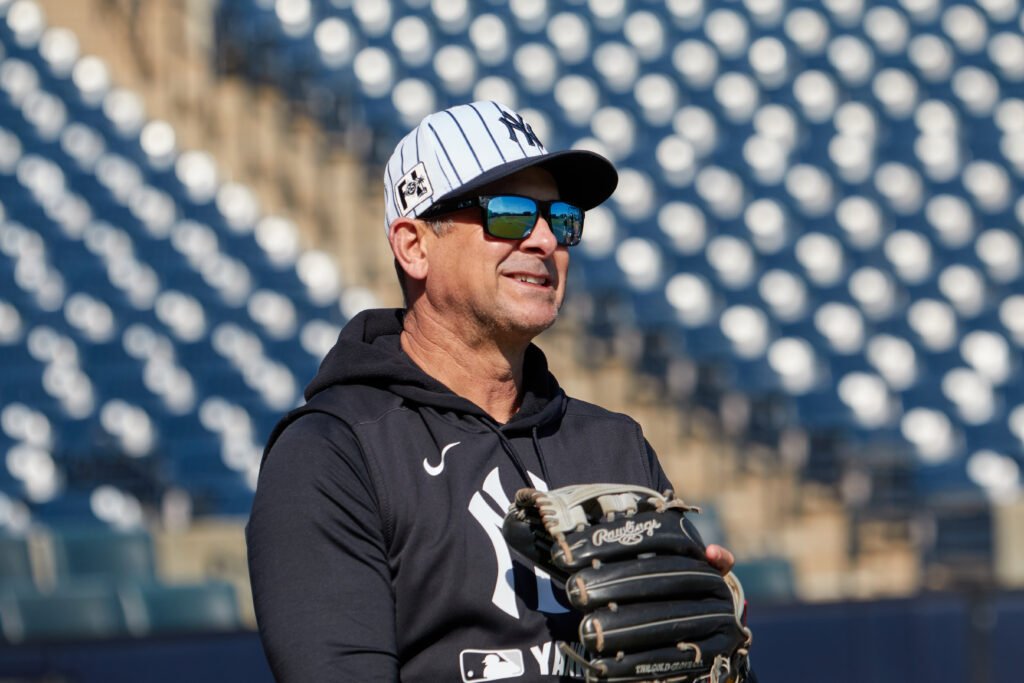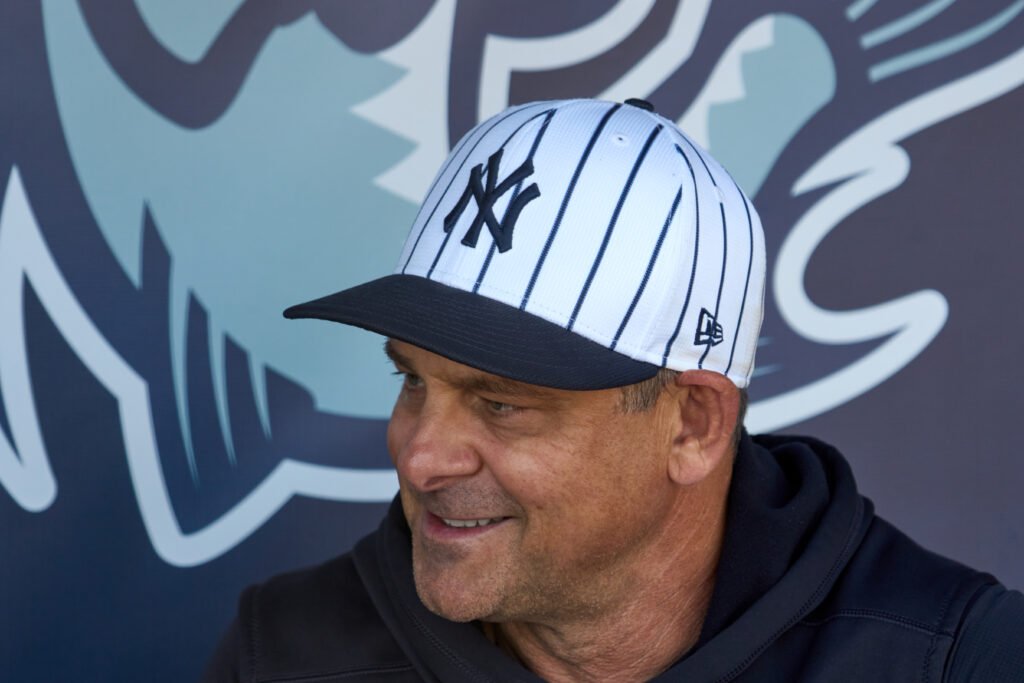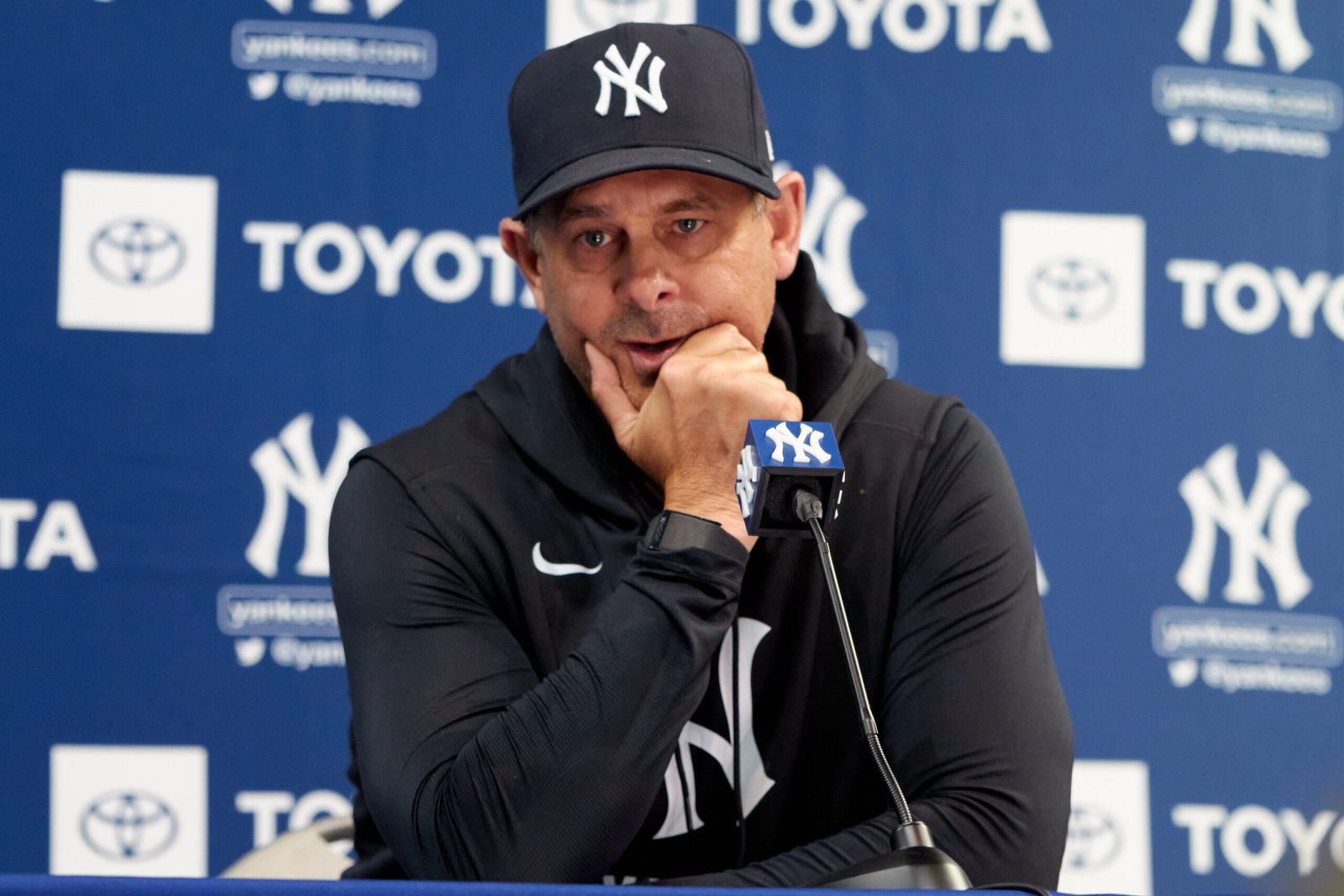Aaron Boone took the helm of the Yankees in 2018 and immediately delivered success. In his first season, Boone led New York to a 100–62 record (.617) and a Wild Card berth, becoming just the sixth rookie manager ever to win 100 games. He followed that with 103 wins in 2019 (.636) and an AL East title. Even in the pandemic-shortened 2020 season, Boone’s Yankees went 33–27 (.550) and made the postseason. The trend continued in 2021 (92–70, Wild Card) and 2022 (99–63, AL East champions). Aside from an injury-riddled 2023 (82–80) that snapped the playoff streak, Boone’s clubs have been perennial contenders. In 2024, the Yankees bounced back to an AL-best 94–68, capturing another division crown and the franchise’s first AL pennant since 2009. Boone’s year-by-year record stands as a testament to consistency: six 90+ win seasons (2018, 2019, 2021, 2022, 2024) in his first seven full seasons. Excluding the 60-game 2020 season, the Yankees have averaged 95 wins per year under Boone, an elite level of regular-season performance.
The Yankees have reached the playoffs in six of his first seven seasons with Boone as manager. That includes three trips to the American League Championship Series (2019, 2022, 2024). Boone’s postseason record through 2024 stands at 22 playoff wins, the second-most of any AL team in that span. Key October results include a Wild Card Game victory in 2018, an ALDS win in 2019 (before falling to Houston in a hard-fought ALCS), and another ALDS triumph in 2022 (again stopped by Houston in the ALCS). The crowning achievement was 2024’s postseason run, where Boone guided New York to the World Series (winning the ALDS and ALCS). While the Yankees fell short in the 2024 World Series, Boone joining the likes of Casey Stengel and Joe Torre in making 6 playoff appearances in 7 years is rarefied air. In fact, Boone is one of only two managers in MLB history (with Dave Roberts) to reach the postseason 6 times in his first 7 seasons. His 22 postseason wins already rank fifth in Yankees franchise history for a manager. The narrative that Boone “can’t win in October” is not backed by the data, he has consistently gotten the Yankees deep into the playoffs, and only a handful of teams have won more playoff games since 2018.

Comprehensive Data and Legendary Comparisons
Beyond win-loss records, Boone’s impact is evident in the Yankees’ underlying team statistics during his tenure. Offensively, New York has consistently been a top-tier unit. In four of Boone’s first five seasons, the Yankees’ OPS+ was well above 100, reflecting one of the most potent offenses in baseball. Boone’s clubs led the majors in home runs in 2018 and 2019, setting a then-MLB record with 306 team homers in 2019 (a testament to the aggressive, power-centric approach he’s managed). On the pitching side, New York’s staff has also thrived as multiple Boone-led teams (e.g. 2022) featured ERA+ figures comfortably above 110. Overall, from 2018–2024, the Yankees’ run differential has been among the league’s best each year, often in the +100 or higher range, translating to strong statistical records and justification for their win totals. By one measure, since 2018 the Yankees have the 4th-best overall record in MLB (behind only the Dodgers, Astros, and Braves), aligning with consistently high ranks in stats like team WAR and wRC+. In fact, New York accumulated at least ~45 fWAR per season under Boone’s guidance, which places them near the top of the league in cumulative talent output.
So what does this mean? How does Aaron Boone stack up against some of the game’s most respected veteran managers? Well, the numbers suggest he is on a trajectory comparable to World Series champions like Dusty Baker, Bruce Bochy, and Joe Maddon.
Boone’s regular-season win rate is higher than all three of these veteran managers, highlighting his success. In fact, Boone’s win% would rank near the top among active managers and shows he has kept the Yankees at a championship-caliber level every year. His teams have been well-rounded, averaging roughly a 110 OPS+ and 110 ERA+ (indicating consistently above-average offense and pitching). This balance is something even championship managers envy, for instance, Baker’s teams have historically been a bit more offense-leaning (~105 OPS+) and Bochy’s a bit pitching-leaning, but Boone’s squads excel at both simultaneously. The Yankees under Boone rarely rank outside the top 5 in AL OPS+ or ERA+ in any given year. By comparison, Joe Maddon’s clubs (with the Rays and Cubs) had a few down offensive years early on, and Bochy endured seasons with below-average rosters in San Diego. Boone has never had a team OPS+ or ERA+ significantly below league average, a testament to his consistency.
Notably, Boone has yet to win a World Series (as of 2025), whereas Bochy (4 rings) and Maddon/Baker (1 each) have reached the mountaintop. However, Boone’s early-career playoff frequency and reaching a World Series by year 7 put him on a similar trajectory to these peers. Dusty Baker, for instance, didn’t win a title until his 25th managerial year. Boone’s postseason results, multiple ALCS trips and a pennant, compare favorably to where Baker or Maddon were at a similar point in their careers. Moreover, Boone’s game management in October has often been praised; for example, ESPN noted Boone’s tactical moves have at times outperformed even a veteran like Baker in head-to-head playoff meetings.

Player Development and “Next Man Up” Consistency
One criticism of some managers is failing to develop young talent. Boone, however, has presided over notable player development successes and a “next man up” ethos that has kept the Yankees competitive even when stars are injured. Players often credit Boone’s communication and leadership for creating a comfortable environment that allows them to thrive. He fosters a clubhouse where emerging players feel comfortable: “I’m so grateful to have a manager like Aaron Boone in the beginning of my career because of the way that he tries to help players like me, young players,” said Oswaldo Cabrera, who debuted in 2022. “We can have a conversation about whatever… whether we are people like Aaron Judge or Gerrit Cole, he can have the same conversation with me or with any other player. That means a lot… He’s a guy who cares about the players, a guy who cares about the wins”.
Under his tenure, numerous players have blossomed or revived their careers. All-Star slugger Aaron Judge reached new heights, including a franchise-record 62 HR and two AL MVP’s, thriving in the environment Boone helped foster. Young pitchers like Nestor Cortes transformed from journeymen into All-Stars by 2022, crediting the coaching staff’s confidence in them. Boone also oversaw the late-blooming success of players such as Luke Voit (who led MLB in HR in 2020) and Gio Urshela in 2019. The consistent thread is that players are put in positions to succeed. Boone’s Yankees have never had a losing season, and that steady competitiveness suggests strong player development and preparation. Even as big names rotate, the club has gotten reliable production from newcomers, whether it’s rookies like Luis Gil and Cam Schlittler stepping up, or veterans finding a second wind (e.g. Matt Carpenter’s resurgence in 2022). Boone’s steady hand and communication skills are often cited by players as factors in their success. Rather than micromanaging, he’s known for trusting his guys, instilling confidence, and maintaining consistency in roles. The result is a clubhouse where new talents integrate seamlessly, and the team’s performance hardly misses a beat despite roster challenges.
Consistency has indeed been a hallmark of Boone’s style. Through winning streaks and slumps, Boone maintains an even-keeled presence. As he described his approach: he provides “emotional stability in this chair,” so players always know what to expect of him day in and day out. This consistency has helped the team avoid prolonged tailspins. Even following rare disappointments (like missing the playoffs in 2023), the Yankees have bounced back (as evidenced by the division title and pennant in 2024). Boone’s emphasis on process over panic keeps the clubhouse steady over 162 games.
Additionally, Boone’s tenure has seen individual accolades that reflect player success: in 2022, Judge won AL MVP (hitting 62 HRs), and in 2021–2022 the club had multiple Silver Sluggers and Gold Gloves. Pitcher Gerrit Cole just won the 2024 AL Cy Young Award under Boone’s management. While these awards are chiefly credit to the players, a good manager provides the environment for players to reach their ceilings. Boone’s players consistently speak of his positive influence on their routines and mindset.
Clubhouse Culture and Leadership Style
Beyond numbers, Boone’s impact on team culture and player-manager relations has been profound. Boone has cultivated a clubhouse culture built on respect and trust and is known for its cohesion and lack of drama, a notable achievement in the intense New York media market. Players frequently praise Boone as a “player’s manager” who communicates openly and has their backs. Boone is not afraid to stand up for his players. He holds the franchise record for managerial ejections, with 35 ejections through April 2024. His fiery tirades, like the famous “Savages in the Box” argument in 2019, have become part of Yankees lore. Players appreciate this fire. Ask anyone in the clubhouse, and they’ll tell you how much it means to see Boone go to battle with umpires on their behalf. Conversely, he’s also known for a calm, steady demeanor through the highs and lows of New York’s pressure cooker. This balance of fiery competitiveness and empathetic leadership has fostered a tight-knit clubhouse. So much so, that Boone’s culture of accountability without fear has also been credited with making the Yankees an attractive destination for top talent. Under his leadership, the clubhouse avoids panic during slumps and remains focused on long-term goals.
Boone has also embraced analytics and modern coaching, blending them with old-school intuition. He was hired in part for his ability to connect the front office’s vision to the clubhouse. By all accounts, he’s done so successfully. The Yankees’ adoption of data-driven decision-making (from defensive shifts to bullpen usage) has accelerated under Boone, but he’s managed to get buy-in from players for these sometimes-controversial strategies. That speaks to his cultural leadership, he’s a translator between the analytics department and the dugout, a crucial skill for a modern skipper.
In short, Boone’s influence extends beyond X’s and O’s; he’s built a team identity of resilience and unity, crucial for enduring the grind of a 162-game season and the spotlight of postseason play. Boone has cultivated a winning culture defined by accountability, unity, and resilience. His team plays hard for him – a qualitative factor backed up by those frequent comeback wins and avoidance of long losing streaks during his tenure. Boone’s influence on culture is such that the Yankees have only had three managers since 1996 (Torre, Girardi, Boone)– an uncommon continuity that Boone now proudly carries forward.
Criticisms
Boone’s press interactions have often drawn criticism for their tone and lack of forthrightness. Analysts note he frequently defends players and downplays problems, which can come across as evasive, leading to what a Pinstripe Alley writer called “fake transparency”. Fans deride him on social media as “delusional” and “clueless” for ignoring the obvious mistakes. Also notably, Yankees announcer Michael Kay recently scolded Boone for dismissing a reporter’s legitimate question about shortstop Anthony Volpe’s defensive issues. Boone’s lack of candidness on struggles is a frequent source of critique by New York writers and fans.
While Boone generally follows the analytics-backed approach, critics argue his in-game choices (managing leverage/bullpen, pinch-hitters, challenges) sometimes lack the urgency and adaptability they expect from a hands-on manager. Also frequently in question is Boone’s lineup and rest-day decisions. Loyalty to underperforming veterans is often cited alongside his frequent use of platoons and rest days. Observers point to examples like regularly resting players (even during hot stretches) on analytic schedules, and substituting opponents’ platoon advantage for bench players, which sometimes seems to sap offensive continuity. While Boone and the front office defend load management, the uneven playing time has frustrated fans who feel it undermines the lineup’s rhythm.
Conclusion
With his blend of baseball intellect, clubhouse acumen, and consistent results, Aaron Boone has made the case, statistically and culturally, that he is one of the game’s top managers of the current era, and a worthy leader for a franchise defined by excellence. He has overseen near-annual postseason baseball in the game’s toughest market, maintained a .584 win percentage, guided both explosive offenses and elite pitching staffs, and earned deep respect from players and executives for his leadership style. In Yankeeland, managerial success is ultimately judged by championships, however, Boone himself would be the first to say the job isn’t finished. But the evidence is clear that he puts his team in position to win year in and year out. Managing luminaries such as Dave Roberts, Dusty Baker, Bruce Bochy, and Joe Maddon all needed long careers to win a championship. With a World Series title, Boone’s résumé would move into truly elite territory. Until then, the data-driven case is that Boone’s impact and consistency already place him in the top echelon of managers. As Yankees owner Hal Steinbrenner noted in extending Boone’s contract, it’s difficult to find another manager with his blend of analytics savvy, player relations, and winning track record, qualities that all these comparisons reinforce.



No responses yet